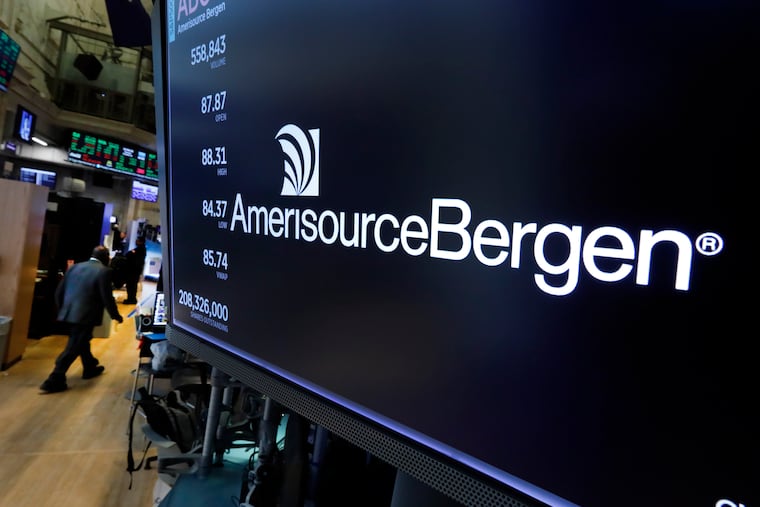Investors in drug distributor AmerisourceBergen reject a challenge to CEO’s $14.3M pay
At the firm’s annual meeting, investors could say if they agreed or disagreed with the CEO’s $14.3 million pay – after the firm set aside a big opioid settlement. BlackRock voted against the pay plan.

Shareholders at drug distributor AmerisourceBergen lost a challenge to the chief executive’s pay package, as a proposed opioid settlement is expected to cost the company billions.
At the company’s annual meeting Thursday, investors had a chance to say whether they agreed or disagreed with the CEO’s $14.3 million compensation package for 2020 by voting on a so-called say-on-pay resolution.
CEO Steve Collis received a 26% raise and a $2.5 million cash bonus in a year when the Chesterbrook-based corporation also took a $6.6 billion hit to its books, in preparation for a potential opioid settlement with state attorneys general.
A majority of shareholders voted in favor of the pay package for Collis, the company confirmed.
AmerisourceBergen did not immediately disclose the vote tally. In the run-up to the meeting, the company touted its record of winning at least 90% approval for the CEO’s pay since 2011. Shareholders will be looking closely at this year’s vote margins.
Connecticut state treasurer Shawn Wooden and Rhode Island treasurer Seth Magaziner led a campaign to reject the executive compensation, because it was calculated by excluding the costs of the opioid settlement. That decision was tantamount to sweeping the costs “under the rug,” Wooden and Magaziner said last month.
At least one major investor also said “no” to the company’s CEO pay resolution: BlackRock, which owns 5.4% of AmerisourceBergen’s stock, as of a January securities filing. BlackRock voted against the company’s pay plan for “failing to sufficiently address the magnitude of the opioid settlement-related adjustment and its effect on executive compensation payouts” a spokesperson said Friday.
A spokesperson for Malvern-based Vanguard, which holds 8.3% of AmerisourceBergen’s shares, said it plans to release an explanation of how it voted next week.
Say-on-pay votes stem from reform regulations after the 2008 financial crisis. The vote isn’t binding, and if a company loses, it doesn’t have to adjust the CEO’s pay. Still, the vote sends a message about whether shareholders are pleased with how the board is choosing to reward top executives, and the outcome could trigger more investor scrutiny of leadership.
AmerisourceBergen, one of the three major U.S. drug distributors, defended its payouts ahead of the annual meeting, saying its formula did not incentivize unnecessary risk-taking, and was designed to encourage “long-term value creation.”
Walgreens Boots Alliance owns 27.7% of the company’s stock, and a Walgreens executive sits on its board — factors that help shore up AmerisourceBergen’s position on matters going to an investor vote.
The say-on-pay challengers are members of Investors for Opioid and Pharmaceutical Accountability, a coalition of state and local pension plans, faith-based institutions, and other asset managers. Collectively, the group oversees more than $4.2 trillion worth of investments, and has pressured drug companies to change pay practices.
The Sisters of St. Francis of Philadelphia are members, as is Philadelphia’s public employee retirement system, and the Pennsylvania treasury, under former treasurer Joe Torsella and current treasurer Stacy Garrity.
“While we were not part of this particular action due to the transition between treasurers, treasurer Garrity does not think a $6.6 billion settlement to address costs related to prescription drug overdoses and deaths warrants a $14.3 million pay package,” a spokesperson for her office said.
Companies are permitted to wait several days before disclosing shareholder vote results in securities filings.
In a statement, Connecticut’s treasurer said the vote tally will be the “true measure” of how investors viewed the company’s executive pay.
“Executives shouldn’t be rewarded when a company and its shareholders take such a big hit, nor should they profit off of an American tragedy that devastated millions of families and cost the U.S. economy more than $1 trillion over the last two decades,” Wooden said. “I am eager to know the tally of the vote, and in particular how many votes outside of the control of its largest shareholder, Walgreens Boots Alliance, were cast against the pay package.”
AmerisourceBergen spokesperson Lauren Esposito said the company “values feedback from investors” and will “continue to work to achieve resolution of opioid matters in a way that seeks to meet the needs of patients, providers, our company, and investors.”
The company’s board and management are keeping “a keen focus on our comprehensive and effective response to COVID-19,” Esposito said.
Distributors are the middlemen between drug manufacturers and the pharmacies and hospitals that dispense medications. Collis, who is also chairman of the board, has served as AmerisourceBergen’s CEO since 2011. Under his watch, annual revenue has grown from about $80 billion to $189.9 billion in 2020. The stock price has approximately tripled since 2011.
During Collis’ tenure, AmerisourceBergen and the two other large distributors have all come under scrutiny for their role in the opioid supply chain. Thousands of local governments and other organizations have sued pharmaceutical companies over the opioid crisis, claiming that distributors did not report or stop suspicious orders of addictive painkillers.
The distributors have denied wrongdoing and continued to defend against the allegations, while also negotiating a potential $21 billion global settlement with state attorneys general, including Pennsylvania’s Josh Shapiro.
AmerisourceBergen included the estimated settlement costs in its financials for 2020. Last week, board members on the compensation committee said they did not believe it was “appropriate” to include those costs when determining executive pay.